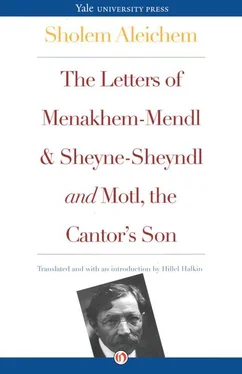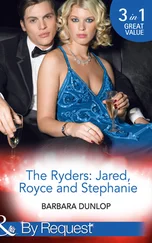“Mother-in-law, we’ve come to live with you,” Brokheh says.
“We barely made it here alive, Mama,” says Elye.
The two sit themselves down and have a good cry with some help from my mother. I try imagining what could have happened. A fire? A fight? Forget it! Yoyneh the bagel maker is bankrupt. That means he’s gone bust. His creditors came, wrote down the worth of all he owned, and carried it off down to the last feather. They took everything in his house, the house included, and rubbed his nose in the dirt. I mean they begged his pardon for cleaning him out and told him to scram.
“God almighty!” my mother said, wringing her hands. “What happened to all his money? He was a wealthy man.”
My brother Elye started explaining that Yoyneh wasn’t as wealthy as all that. Before he could get very far, though, Brokheh butted in and said the opposite. She should only be worth, she told my mother, what her father had been. So what happened to all his money? He spent it on her wedding.
The wedding cost a fortune. Brokheh likes to talk about it. In fact, it’s all she ever talks about. There’s never been, she says, a wedding like it. The pastries, the roasts, the tortes, the honey cakes, the strudels, the breads, the jams and the jellies — all for her wedding!
Now the wedding is over and Brokheh owns a fur stole and a noodle sieve. Naturally, she and Elye can forget the dowry Yoyneh promised them. Elye can also forget his good Sabbath clothes, his prayer shawl, and his linens. His silver watch, too. A shipwreck would have left him with more. My mother is beside herself. A calamity! Who would have thought it? Everyone envied her son’s marriage. Someone must have put a hex on her — or else she did it herself with her big mouth. Either way, she’s the main victim.
“When the chicken fat runs out, all that’s left is an empty hole. You’ll live with me, son, until God has pity.”
That’s what my mother said, offering Brokheh her bed — the one piece of furniture we had left.
MY BROTHER ELYE’S SOFT DRINK
One ruble gets you a hundred!
Buy our book for a ruble plus postage and earn
a hundred or more a month. Don’t waste another minute!
Step right up and see what’s in it!
That’s what my brother Elye read in a newspaper soon after leaving his father-in-law’s. He had been promised three years’ free board by Brokheh’s parents and had barely lived with them for three months. But I’ve already told you all that. I don’t like to repeat myself unless asked.
But this time even asking wouldn’t help because I’m too busy making money. I have to make the rounds with a soft drink manufactured by my brother Elye. He learned to make it from the book advertised in the paper. The minute he read about it he sent off his last ruble and told my mother her worries were over.
“Mama! Thank God we’re saved! From now on we’ll be in money up to here.”
Elye raised a hand to his throat.
“What happened?” my mother asked. “Have you found a job?”
“Better than that,” Elye answered, his eyes bright. He told my mother to wait until the book arrived.
“What book is that?” she asked.
“A book to end all books!” Elye said. Would she settle for an income of a hundred rubles a month?
My mother laughed and said she’d settle for that much a year — in the bank. Elye told her to think big and went off to the post office. He went to the post office every day to ask for his book. A week had gone by since mailing the ruble and there still was no sign of it. Meanwhile, we had to live. “You can’t just spit out your soul when you’ve had enough,” my mother said.
Now why would anyone want to do a thing like that?
The book at last! We unwrapped it and Elye sat down to read. Hoo-ha, the things that were in it! Every way of making money you could think of. There was a hundred-ruble-a-month formula for the best ink. Hundred-a-month directions for the finest shoe polish. A hundred-a-month mouse-cockroach-and-bug killer. Hundred-a-month recipes for liqueurs, lemonade, soda water, barley beer, and other drinks.
Elye chose barley beer. In the first place, from drinks you could make even more than a hundred a month; the book said so itself. And besides, why fool around with ink, shoe polish, and cockroach killers? The one question was which drink to choose. Liqueurs called for capital like Rothschild’s. For soda water you needed a special machine, a thingamajig that cost a fortune. Barley beer was the best bet.
Barley beer is a drink that costs next to nothing to make and sells well — especially in a hot summer like this one. We have a Jew in our town, Borukh the barley beer maker, who’s made a pile from selling it in bottles. Borukh’s barley beer is world famous. It explodes from the bottle as though shot from a gun. Only Borukh knows its secret. Some say he doctors it with gunpowder. Others say raisins. Or hops. Comes summertime, he doesn’t have enough hands to count his money with.
The barley beer Elye makes from his book isn’t bottled. It doesn’t explode, either. But it is special. I can’t tell you how it’s made because Elye won’t let anyone watch him making it. He pours the water and shuts himself up in my mother’s room and measures out the other ingredients. No one — not me, not my mother, not even Brokheh — is allowed in. But if you can keep a secret, I’ll tell you what’s in it. That much I know.
Here goes, then: one lemon peel, some treacle, a sort of vinegar called crumby tartar, and lots of water. Water is the main ingredient. It takes the place of the barley. You stir everything with a corncob, or just a plain stick, and the barley beer is ready. Then you pour it in a jug and add some ice. It’s the ice that does it. Elye’s drink isn’t worth beans without it. You won’t find that in the book. I learned it the hard way. I tried drinking some warm barley beer and thought I was going to die.
The first batch of barley beer was finished. Now I had to sell it. Who else was there? It was beneath Elye’s dignity. After all, he’s a married man. And we could hardly let my mother run around the market and shout: “Barley beer! Jews, get your barley beer!” The job was mine by unanimous decision. That was fine with me. In fact, I was tickled pink. Elye showed me what to do. I had to hold the jug in one hand and a glass in the other and chant:
Jews, have a drink,
A kopeck a glass!
It’s cold and it’s sweet!
Get our brew while it lasts!
I’ve told you I have a good voice, a soprano I got from my father. I just confused the words, so that they came out:
Sweet barley beer,
A kopeck a Jew!
It’s cold and it’s fresh!
Be the last for our brew!
I don’t know if that’s what did it, or if our barley beer was really that good, or if it just happened to be a hot day, but I sold out my first jug in half an hour and went home with fifty kopecks in my pocket. Elye gave the money to my mother and refilled the jug. Five or six rounds a day like that, he said, six days a week, and we’d clear our hundred rubles a month. The overhead was next to nothing. The only expensive item was the ice.
That’s why I had to sell the barley beer quickly — to make the ice last for the next jug. I walked as fast as I could. I mean, I chanted and ran, followed by a flock of little parrots. I didn’t pay those children any mind. I just wanted to empty my jug and refill it.
I can’t tell you how much I made that first day. All I know is that Elye, Brokheh, and my mother couldn’t do enough for me. For supper I was given a slice of honeydew with my watermelon, plus two whole bucket plums. And I’m not even talking about the barley beer. We drank barley beer like water. Before I went to bed my mother sat me down and asked me if my feet hurt. Elye laughed. He said a big boy like me wasn’t bothered by sore feet.
Читать дальше












